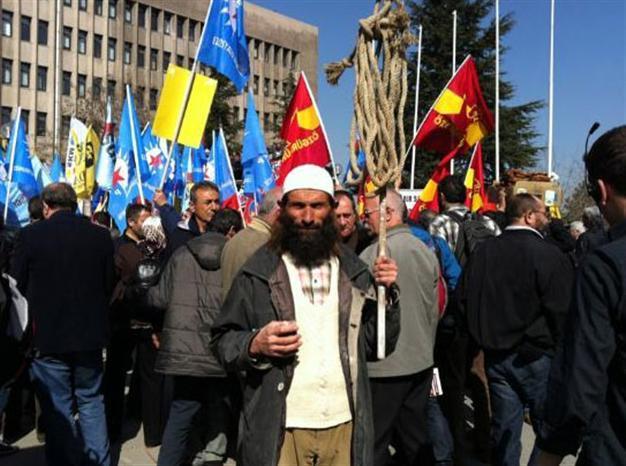Turkey's historic trial over 1980 coup begins
ANKARA - Hürriyet Daily News

Protesters gather in front of Ankara courthouse. Hürriyet photo
An Ankara court have begun hearing a landmark trial against the two surviving leaders of the 1980 military coup today.The courtroom was overcrowded with spectators and dozens of people who applied to intervene in the trial. Intervening parties included Turkey's Parliament, Cabinet and government, eight political parties and hundreds of people who claim to be victimized by the coup.
Turkish prime minister's office also filed a complaint against the coup leaders.
Spectators who were left standing because of the crowd refused to sit on the benches reserved for the suspects, after court head told them they could, broadcaster NTV reported.
Lawyers of the intervening parties requested the court to place suspects Gen. Kenan Evren and Gen. Tahsin Şahinkaya under arrest. Lawyer Fikret Babaoğlu proposed Evren and Şahinkaya be brought into courtroom in a hospital bed confined in a cage, as in the case with Egypt's former ruler Husni Mobarak's trial.
"Evren was no less of a dictator than Mobarak," Babaoğlu reportedly said.
The court rejected a request by the defendants' lawyer for the case to be dropped and said the court had authority to try the coup leaders.
The suspects' lawyer had said the court had no authority to put the coup leaders on trial. The lawyer reportedly showed a copy of the 1982 Constitution to the court and said, "You cannot try this Constitution in court." Though heavily amended, the Republic of Turkey is still run by a Constitution put into practice by the 1980 coup leaders.
Turkey’s government, Parliament and two largest opposition parties have lodged applications to become intervening parties in a landmark trial that opens today against the two surviving leaders of the 1980 coup.
The trial against retired Gen. Kenan Evren, 94, and retired Gen. Tahsin Şahinkaya, 86, marks a first in a country where the army has unseated four governments since 1960.
“Reasonable minds think alike,” Prime Minister Recep Tayyip Erdoğan said yesterday as he announced that one of his legal advisors had applied on behalf of the government.
Earlier in the day, an application signed by Parliamentary Speaker Cemil Çiçek was submitted to the 12th Court of Security Crimes seeking an intervening party status for Parliament. “The military intervention, which the suspects carried out, used unconstitutional powers to forcibly usurp Parliament’s legislative authority,” the application said.
The main opposition Republican People’s Party (CHP) and the Nationalist Movement Party (MHP), which were both closed down after the Sept. 12, 1980 coup, followed suit. The Peace and Democracy Party (BDP) had already lodged a similar application.
Asked whether he would also intervene, Süleyman Demirel, the prime minister ousted by the coup, told the Hürriyet Daily News by telephone yesterday that he had nothing to add to remarks he made on the issue last week. Demirel had told daily Sabah that he would not intervene, even though he and the nation suffered a lot. “I don’t think you can reach anything good this way,” he was quoted as saying.
Nearly 500 people and institutions have requested intervening party status in the trial on the grounds of being victimized by the coup. Only 30 of them were to be allowed into the courtroom today after a draw; the courtroom is expected to take about 150 people in total as spectators.
The Turkish military unseated governments on May 27, 1960; March 12, 1971; Sept. 12, 1980; and in the wake of the Feb. 28 process in 1997.
Currently, hundreds of active-duty and retired military personnel, including former Chief of General Staff Gen. İlker Başbuğ are on trial on alleged coup plot charges in the ongoing Ergenekon and “Balyoz” (Sledgehammer) cases.
Evren and Şahinkaya, the two surviving members of the five-man junta, are both currently in hospital and are not attending the hearing. The court has asked the Forensic Medicine Institute to decide whether the suspects are fit to attend the hearings, but the institute’s report was not ready as the trial started. The two have requested that the court allow them to answer questions via video-conference. The pair face life imprisonment if they are convicted of committing crimes against the state – the heaviest punishment available since Turkey abolished the death penalty in 2002.
Evren toppled the government after a bloody struggle between rightist and leftist militants that had left the political leadership helpless and plunged the country into chaos.
The coup was initially welcomed by a population relieved to see order restored but the army embarked on a sweeping campaign of oppression that especially targeted leftist and Kurdish movements. Political parties were closed down, their leaders imprisoned and thousands of people ended up in torture chambers, with 50 formally executed.
















